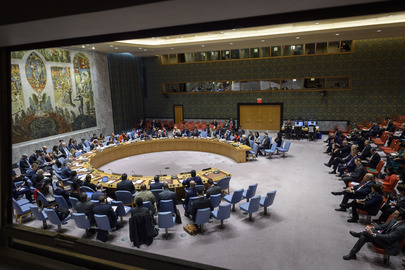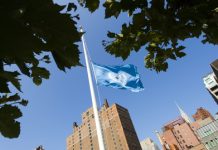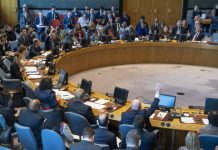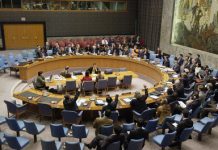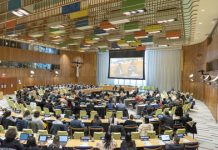Natalia Kanem: I will just summarize it by saying UNFPA has upheld the rights and choices of women and girls, adolescent girls in particular, when it comes to sexual and reproductive health and rights.
We have trained, hundreds of thousands of midwives. We have provided contraception, literally billions of units during that period. We have modernized our ability to reach the last mile. That means lines are shorter. Women can get care closer to their homes. And UNFPA has had tremendous achievements in expanding our humanitarian service. And obviously, the need is so great that that’s really been important.
And I think we’ve also put our stamp on the idea that world population is a worthy subject of discussion, and the lens for that should be through the eyes of a ten-year-old girl. She’s entering teenage hood. Will she be able to stay in school, graduate and make her way through the world? Or is she going to be derailed by things like child marriage, or female genital mutilation or utter abject poverty, which is going to limit again her rights and choices.
So, it’s been really exciting. There have been some daunting moments, but I’m really always amazed at what my colleagues and UNFPA accomplish. Really with, a big imagination and a big heart.
Mita Hosali: You’re leaving at a critical and, I would say, uncertain moment. Major funding cuts from donors, including the United States, staffing cuts as a result of reform initiatives. What is your message to the staff, these wonderful people who work in the field day after day, month after month, year after year? As well as to the outside world?
Natalia Kanem: Well, you know, the UNFPA staff are a remarkable country. There are 5000 plus of us and 151 locations around the world. And our staff have weathered many a storm. But I think right now things feel a bit more acute because the multilateral system itself has come under question at a time when it is needed now more than ever.
And our Secretary-General has been quite excellent on that point to the staff. I remind them that the reason we get up in the morning is to make sure that we can further an agenda that actually advances human achievement, makes the family closer and kinder, and always prioritizes. What is this ten-year-old girl going to do?
What is she going to be able to accomplish when she grows up? We in UNFPA, of course, have had the unwelcome situation where our funding varies, especially the funding from the US, which has been a founding member of UNFPA. And when they are donating, they’re a big donor. And when they step back, we feel it.
I believe that we have been better prepared in the sense that our budgeting and our diversification of funding has been extraordinary in recent years. UNFPA, has more money than we’ve ever had year on, year on year. During my tenure last year, 1.7 billion USD. But this is not something that we take for granted.
So, I’m very emphatic and speaking with our team that we do have to prove ourselves each and every day. And when we make mistakes, we’ve got to get up and rectify them and find partners who are going to be allies. I, I’m coming now from Sevilla, where there was a huge success for the financing for development proposition, although there’s so much worry about debt, the new economic, turbulence in the world and there UNFPA worked very well with our banking partners, with our partners who are innovating, a new development impact fund in Kenya to keep adolescent girls in school through providing sexual and reproductive health and rights information that doubled their target in the two test years and generated huge interest. And I also think that one of the wise things to do when our agenda comes under attack is to remind people that every life matters, and these funding cuts have devastating impact on women and girls who are always bearing the brunt of whatever it is climate change, conflict, the migration of people. It’s women and girls who are, going to be losing their health care, who are going to be unable to safely walk to the school. So, I think we have to tell the truth, and we have to tell it in a way that’s compelling enough so that we can garner the allies that this, that this movement for sexual and reproductive health and rights really requires.
Mita Hosali: You touched on the word conflict and, I think probably early in your term, I recall you, going to Cox’s Bazar with the Secretary-General and some other senior officials and we captured you speaking about life saving services for Rohingya women and children. Well, here we are, fast forward, so many years later, and there are many more conflicts on the world stage. There’s Ukraine, there’s Sudan, there’s Gaza, and others as well from before. In these situations, what are the real-life consequences when funding dries up?
Natalia Kanem: I think the, fact is the humanitarian need that has increased in such devastating fashion over the course of even the last ten years always means that women and girls go hungry. Women and girls are neglected in terms of health. They always prioritize the rest of the family. And moreover, sexual and gender-based violence also skyrockets during these crises.
And it’s really important for the United Nations to be there for UNFPA and all our partners, to stand for the dignity of people, regardless of the life circumstance that they find themselves in. In a place like Cox’s Bazar, in a place like Haiti, the type of safe spaces that UNFPA can offer. That tent may just be decorated with, you know, crayon images. It represents the respite that a woman needs in a time of crisis.
In Ukraine. I think the type of psychological counselling that we can provide makes a world of difference. When you’ve lost everything that surrounds you and the insistence that biological needs, which can be a source of embarrassment for a girl who gets her period in the middle of, a refugee camp, have to be presented in a way… you know, we call our kids dignity camps for that reason. And what goes into them is decided by the community. That toothbrush, that menstrual pad, that, blanket, the shawl. If you need it, whatever it is, that takes you out of that space of desperate need and reminds you that you’re going to live to fight another day. And that’s what the United Nations is there to do to help see that that brighter day arrives.
Mita Hosali: A lot of what, of course, you must do in UNFPA, as do the other development agencies, it’s about incremental progress. Years and years ago, we began to talk about female genital mutilation – I know UNFPA has worked on this very determinedly over the years. It is something we have covered, from our platforms, from UN News. It’s something that I’m very passionate about – have you seen any real examples of concrete progress with legislation, working with civil society again, where some of this is being is turned back and being made just unacceptable?
Natalia Kanem: This is really the heart of the matter. Changing mindsets is what’s going to make a difference for that girl, even in the intimacy of her family. The understanding, the change of mindset, her community, her religious leaders, her traditional leaders, her schoolteacher, the whole array of society, needs to shift that mindset.
I think the fact is, when I think of the work that UNFPA and UNICEF and so many others and UN-Women have been doing to quell child marriage, to quell female genital mutilation, and also to work decisively against gender-based violence, because a lot of teen pregnancy, etc. is not by choice. It’s coercion. It’s making a huge difference.
And we see this in certain statistics. For example, the maternal mortality rate, which has dropped by 40 per cent over the last 20-odd years. This is a huge achievement because it’s a health system mindset that’s prioritizing women, and also our success at advocating to young, undernourished a much higher risk of dying and pregnancy. For FGM, we saw big progress which COVID, I have to say, stopped the clock a bit because girls were not going to school, they were in communities where the practice, was rushed because of this circumstance. We’ve seen a lot of young people speaking out against FGM. And, you know, it’s always better when it’s someone from within that understands the culture that can stand with the young people of the culture.
Even, in Indonesia, which numerically, because of the big population, has big numbers of FGM, we’ve seen drops in the practice. But it’s not a one shot and done, so we understand the need to persevere. We understand that when we succeed with this agenda, it’s really the community that’s going to succeed. So, it’s been very important to see religious leaders and traditional leaders standing against certain practices. And it’s been also, I think, really important to have the opportunity to work with school systems so that the girls themselves will understand the risks and be able to take better decisions about their options.
Mita Hosali: You mentioned maternal mortality rates improving. And I know something that UNFPA has become much more involved with is the data side of things. And, you know, working with the data dashboard, etc. We know that, for example, there are more than 8 billion people in the world, India has overtaken China. We also know that average life expectancy has gone up substantially to 73 or so.
But I guess the concern is still, are we making the same progress with women and girls, sexual health and their needs basically. So, how can we protect the gains while ensuring that the women who are still not getting what they need and young girls also get prioritized essentially?
Natalia Kanem: For me, the data tell the story, and it’s a story that has to be shouted from the rooftops. One of my predecessors, the great doctor Martha Sadiq, said, put women and girls at the centre of development if you wish to make progress. And every single data point shows that when it comes to the indices of, progress, women and girls are the likeliest to be left behind.
It doesn’t really matter which continent, and even within countries as well as between countries. So, for us, we’ve tried to wield that data as the type of weapon that helps lawmakers make better laws, that helps families make better decisions. This year, our State of World Population report focused on something that the UN hadn’t really brought to the fore before, which is this whole question of fertility. And it turned out when we asked women who wanted a child or two or three, we asked men too why they were not able to have the family size that they wanted. They cited most of them, economic factors, housing factors, as well as their doubts that, with economic uncertainty, they would be successful as parents, Earlier, we also, highlighted the fact that only half of the world’s pregnancies are deliberately intended.
So nearly, you know, the other half were, quote unquote, accidental. Sometimes happily so, but many times interrupting the plans, of the life of that adolescent girl. So, it’s, been important for us also to make data easier for people to access. And the dashboards that you’ve mentioned, our Population and Data Division, have spent so much time with countries one by one by one country led census preparation.
And this is something that’s very appreciated when, something matters and when you count it and when you can track it, it makes all the difference.
I’ll also mention that one of the worries that I have is with the retraction of funding and the evaporation of certain databases. We need to be able to track year by year those maternal mortality statistics so we know where are the pockets of places that we need to concentrate on. So, to make tough choices, you really need good data.
Source of original article: United Nations (news.un.org). Photo credit: UN. The content of this article does not necessarily reflect the views or opinion of Global Diaspora News (www.globaldiasporanews.com).
To submit your press release: (https://www.globaldiasporanews.com/pr).
To advertise on Global Diaspora News: (www.globaldiasporanews.com/ads).
Sign up to Global Diaspora News newsletter (https://www.globaldiasporanews.com/newsletter/) to start receiving updates and opportunities directly in your email inbox for free.


